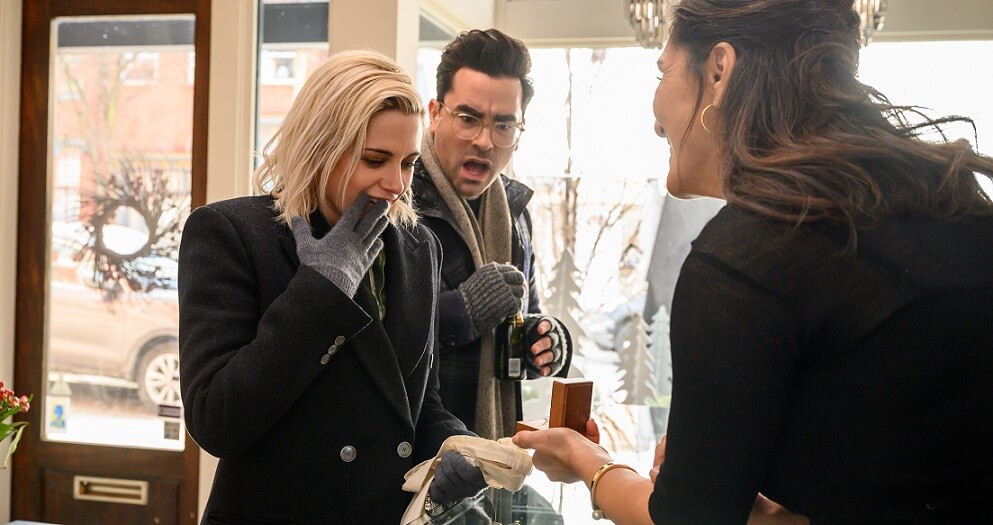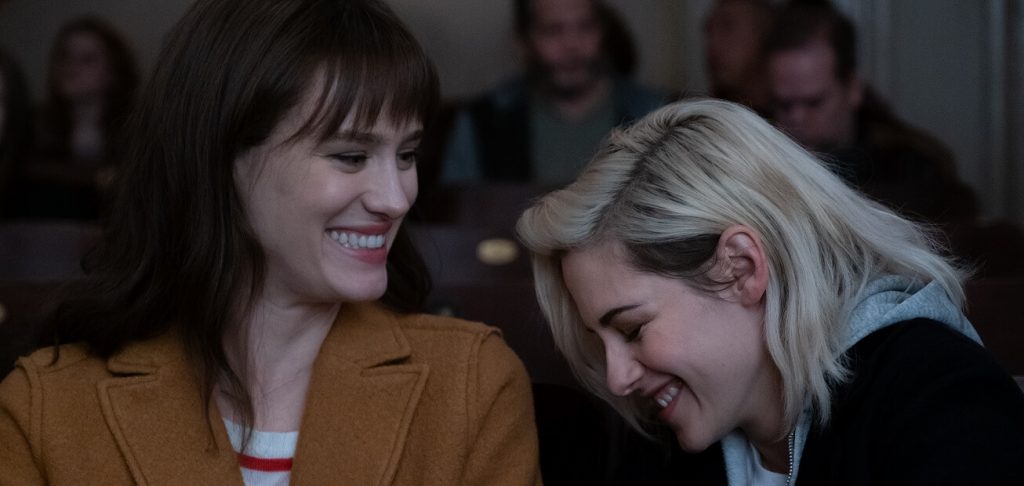One fine day just prior to Christmas, Pittsburgh-based journo Harper (Mackenzie Davis) takes her girlfriend, Abby (Kristen Stewart) to her picturesque hometown to spend the holidays with her family. For her part, Abby aims to put a ring on it, even going so far as planning to ask Harper’s father, Ted (Victor Garber), for his blessing, much to the disgust of her gay BFF, John (Dan Levy). There’s a spanner in the works, though; Harper hasn’t actually come out to her family yet, so it’s separate bedrooms, improvised cover stories, countless close calls, and the inevitable big emotional climax. Call it A Christmas Closet, if you like…
Happiest Season is great. What’s interesting is how easily it could not have been. Holiday-themed films tend to trend to the mawkish, and slapping a queer romance on top of a bog-standard “meet the family” comedy of manners is no guarantee of success (representation is important, but it’s not a synonym for quality). Happily, wonderfully even, Happiest Season not only deftly avoids the obvious pitfalls of the Christmas rom-com genre, it delivers the requisite tropes with style, wit, and warmth. Actor-turned director Clea DuVall (The Faculty forever, amirite?), who co-writes with co-star Mary Holland, conducts the proceedings with a light, knowing touch. We’re navigating the usual holiday emotional obstacle course – a hostile competitive sister (Alison Brie), a perfectionist, passive-aggressive mother (Mary Steenbergen, cuttingly hilarious), an old boyfriend (Jake Dorman), and even an old girlfriend (Aubrey Plaza bringing real depth and nuance to a key supporting role), but crucially the story is centered on our gay couple. They’re not othered, they’re not comic relief (Levy certainly is for the most part, and bless him for it) – it’s very much their story. In point of fact, it’s more Abby’s story than Harper’s to no small degree; as Harper falls back into behaviour patterns that please and support her picture-perfect, rather conservative family, we center on Abby, alone and adrift in small town Americana, as she struggles with loving someone who isn’t quite ready to be her authentic self. This cuts deeper than you might expect, as Abby hasn’t celebrated Christmas since the death of her parents when she was 19. Her orphan status is played for laughs – really, it works! – right up until it becomes an emotional gut-punch, and we start to get a handle on just how painful Harper’s well-meaning charade really is.

The main pressure, apart from her parents gently cloying traditionalism, is that dad Ted is taking a run at mayor on a family values platform, and a suddenly out daughter is simply not in the social media campaign plan. So Happiest Season is low-key political, even if it never comes right out and declares Ted’s party affiliation (but I could make a fairly confident bet). First and foremost, however, the film is about emotional politics; negotiating your position in a family unit and how we behave when the place we’re assigned, the rile we’re given, becomes unendurable. There’s plenty of under-the-surface turmoil in family apart from Harper’s sexuality, and by the time the credits roll they’ll all be dragged out into the light.
So, it’s a good thing it’s funny, hey? Drily, drolly, hilariously so. Happiest Season doesn’t trade in punchline gags but rather the sort of comedy that’s deeply rooted in character and inference. Co-writer Mary Holland is the MVP here, narrowly edging out Levy with her turn as Harper’s sister Jane, a well-meaning eager-to-please weirdo who’s clearly screaming on the inside in response to how her parents brush her aside and minimize her. It’s difficult to pull out examples because they’re so reliant on context; to anyone who hasn’t seen the film, “Stay at the table” is meaningless, but in the movie itself it had me howling.

The cast is absolutely stacked. Davis and Stewart are simply cute AF, and their chemistry is palpable; there’s not a false note rung in their dynamic. Veterans Steenbergen and Garber make it all seen effortless, even as they’re delivering lines deliciously layered with comedy and pathos. Comic stars Plaza and Brie handle the dramatic demands extraordinarily well, and the supporting ensemble are on point.
It is a tad too long though, with a bit of sag in the middle stretch that could be trimmed to good effect, and after a while it becomes kind of ludicrous that Harper’s family never pick up on Abby’s Extremely Big Queer Energy which, even after Levy’s John hangs a hat on it (“Have they never met a lesbian before?” he asks incredulously). These are piddling complaints, however. Happiest Season is an absolute charm of a film, funny, heartfelt, romantic, emotionally resonant, and destined to be on high rotation every silly season going forward. Make time for it. (9/10)


